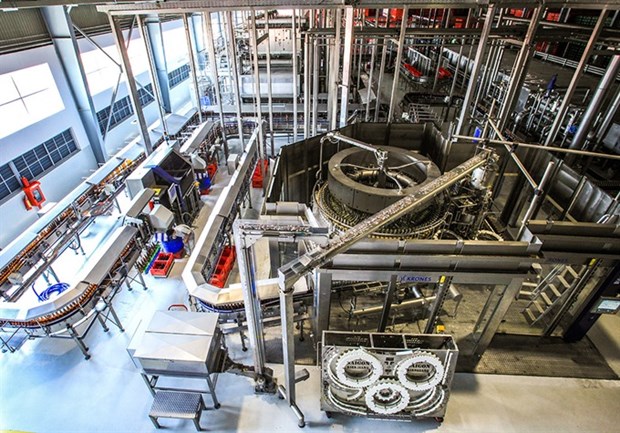Equitisation of SOEs from perspective of foreign investors
 A production chain at the Saigon Alcohol Beer and Beverages Corporation’s plant in Thanh Loc Industrial Zone, Kien Giang province (Source: VNA)
A production chain at the Saigon Alcohol Beer and Beverages Corporation’s plant in Thanh Loc Industrial Zone, Kien Giang province (Source: VNA)Nguyen Duy Long from the
ministry’s Corporate Finance Department made the statement at a seminar
entitled “Equitisation of SOEs from the perspective of foreign investors” held
by the National Assembly Economic Committee and the American Chamber of
Commerce in Hanoi on September 8.
The seminar aimed to
provide opportunities for managers and enterprises at home and abroad to meet
and exchange experiences in the divestment of State capital in equitised
enterprises.
It is expected to help
the Economic Committee advise the National Assembly and recommend legal
policies on the management and use of State capital and assets in enterprises.
Long said Vietnam equitised
508 businesses in 2011-15, which had more than 189 trillion VND (8.4 billion USD)
of State owned capital. In 2016, the State approved equitisation plans for 58
businesses, six of which were SOEs.
“The system of SOEs has
been restructured from 1,500 enterprises in 2010 to about 600 in 2016, mainly
operating in key sectors to ensure macro balance for the economy,” said Long.
According to the report,
equitisation has helped restructure human resources for firms and society,
along with developing the capital market and stock market. It has also changed
corporate management, helping raise business efficiency.
However, equitisation in
a number of ministries and localities has fallen short of plans. The rate of
State capital at equitised companies is still high because the amount of
publicly offered shares was low compared with corporate equitisation. In particular,
the mechanism of SOE equitisation has revealed several shortcomings which need
to be studied and fixed.
At the seminar,
participants mentioned things hampering equitisation. Among them, besides some
objective reasons, the SOE equitisation process was influenced by global
factors and regional economies.
Many participants said
several ministries, sectors, localities, economic groups and State corporations
have not actively organised equitisation.
Many equitised SOEs, who
are meant to list on the stock market, have not yet listed after launching
initial public offerings (IPOs). In addition, employees at various levels,
sectors and enterprises are still afraid of equitisation and worried about
their role after the process, which slows down its progress.
Tran Dinh Thien,
director of the Vietnam Institute of Economics, pointed out a paradox of the
equitisation process that although 96.5 percent of enterprises have been
equitised, only eight percent of State capital was transferred to the private
sector.
According to Thien, that
is because the proportion of State capital for sale is very limited.
“Therefore, private enterprises are excluded from the right to participate in
the management, not to mention corporate controlling rights. This is also one
of the reasons why private investors, including foreign ones, are not
interested in buying SOEs,” said Thien.
Participants said that
it was necessary to complete a system of mechanisms and policies for the
restructuring of SOEs, to carry out the roadmap for equitisation and divestment
of State capital approved by State agencies and to ensure transparency in the
restructuring of state enterprises.
Adam Sitkoff, executive
director of the American Chamber of Commerce in Hanoi, said that in order to
increase the confidence of investors, equitisation and divestment must be
transparent and investors must be provided with full information related to the
businesses.
Meanwhile, Tony Foster
from Freshfields, a law firm in the UK, said that to attract serious and long
term investors, they should be able to buy controlling stakes of equitised
businesses or divestment of State owned enterprises.
At the seminar, many
participants also said that to overcome the shortcomings in the equitisation,
the country would need to apply asset assessment methods that suit the market
mechanism, ensuring State capital and assets and corporate values are properly
assessed.
At the same time, it
would be essential to select independent valuation consultants with prestige,
encouraging investors to buy shares and contribute capital to enterprises when
they carry out equitisation and divestment of State capital. -VNA













